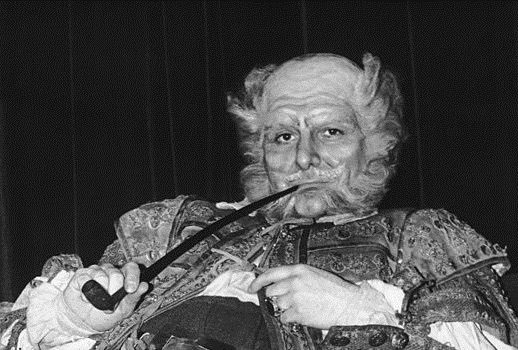
While many performances were available, I chose one from Teatro Colón in 1965 with an amazing ensemble led by Geraint Evans, Raina Kabaivanska, Sesto Bruscantini, Oralia Domínguez, Jeanette Scovotti, and Luigi Alva.
Evans was my first Falstaff, making his Met debut in the fifth performance of the now-legendary 1964 Franco Zeffirelli production. In eight seasons, he proved his versatility by alternating performances as Verdi’s fat knight with Mozart’s Figaro, Don Pizarro with Leporello, Captain Balstrode with Beckmesser, and a few Wozzecks thrown in for good measure.
He is also the star of George Solti’s magnificent RCA recording of Falstaff, notable for many reasons including then-unknown kids named Mirella Freni and Alfredo Kraus.
Kabaivanska, who also sang Alice Ford in the Zeffirelli production, is one of your alte Jungfer’s favorites, and was introduced to my Mixcloud site as Desdemona in a Solti-led Covent Garden Otello with Mario Del Monaco and Tito Gobbi.
Bruscantini had a long career, eventually settling comfortably into the basso buffo repertoire, making an overdue Met debut at the age of 61 in L’italiana in Algeri in 1981. His other Met appearances included Dr. Bartolo in Il barbiere di Siviglia and Dulcamara, which he sang in a telecast performance of L’elisir d’amore with Luciano Pavarotti and Kathleen Battle.
Domínguez became – and remains – a sensation with her show-stealing, smoldering Amneris in the infamous 1951 Mexico City Aida with Maria Meneghini Callas and Del Monaco. A little known – and totally amazing – fact is that she was just 25 when she gave that legendary performance, and had made her operatic debut only one year before.
An incredibly versatile artist, she was as comfortable in all the great Verdi mezzo roles including the Requiem (check out the 1954 EMI recording led by Victor de Sabata with Elisabeth Schwarzkopf) as she was in Monteverdi, Vivaldi, Bach, Rossini, Brahms, Mahler, Stravinsky, and, rather surprisingly, was Herbert von Karajan’s Erda in his Osterfestspiele Salzburg Ring Cycle and the subsequent DG recordings.
Another surprise was her Covent Garden debut in 1955 as Madame Sosostris in the world premiere of Michael Tippett’s The Midsummer Marriage, learned by rote (she spoke no English), alongside the 28-year-old Joan Sutherland. Performing until 1982, she died in Milano less than three years ago at age 88.
Our Nannetta and Fenton, who also appeared together in the Zeffirelli production, are still with us. Scovotti, Zerbinetta in my Mixcloud upload of a 1967 Wiener Staatsoper Ariadne auf Naxos, sang over 80 Met performances covering the coloratura/soubrette repertoire.
Alva, who sang over 100 Met performances in a decade, was as close to a true tenore di grazia as was to be heard in the 1960s and 1970s (post-Cesare Valletti), specializing in lighter repertoire which prolonged his career into his mid-60s.
Maestro Fernando Previtali, a pupil of Franco Alfano and Vittorio Gui, was known as a Verdi specialist and led a cycle of the composer’s operas in commemoration of the 50th anniversary of his death. Among his many recordings is the beloved RCA La traviata with Anna Moffo, Richard Tucker, and Robert Merrill.
While he held various positions in his native Italy, he was music director of the Teatro Colón in the 1960s, and later at the Teatro Regio in Torino and the Teatro Comunale in Genova.
At the risk of being jumped on, I’d like to posit one of my rhetorical questions: has any other opera composer concluded a lengthy career with such a quicksilver masterpiece, so full of light and joy?
Giuseppe Verdi: Falstaff
Teatro Colón, Buenos Aires
Fernando Previtali, conductor
Sir John Falstaff – Geraint Evans
Alice Ford – Raina Kabaivanska
Ford – Sesto Bruscantini
Dame Quickly – Oralia Domínguez
Nannetta – Jeanette Scovotti
Fenton – Luigi Alva
Meg Page – Carmen Burelio
Dottore Cajus – Italo Pasini
Bardolfo – Nino Falzetti
Pistola – Andres Huc-Santana


